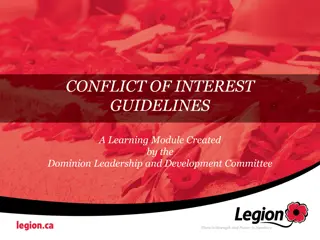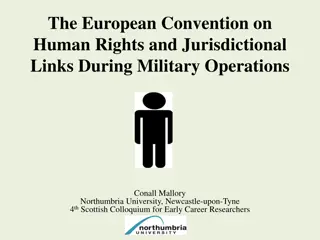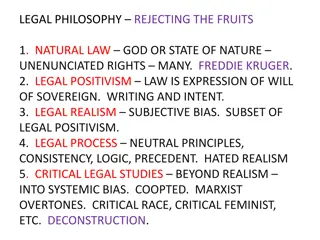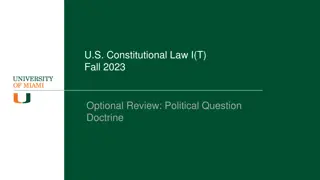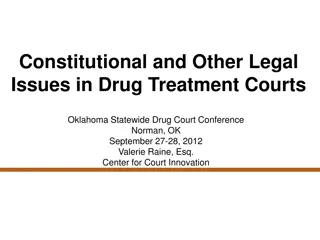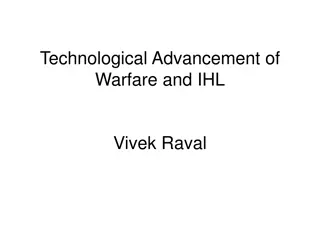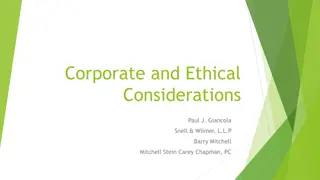Legal Cases Analysis and Jurisdictional Conflicts
This content explores various legal cases and conflicts related to jurisdictional laws and statutes. It delves into topics such as domicile laws, loss-allocating rules, forum law usage, affirmative defenses, and interests of different jurisdictions. The content discusses influential cases like Neumeier v. Kuehner (NY 1972) and Babcock, highlighting the complexities of legal matters spanning across different regions.
Download Presentation

Please find below an Image/Link to download the presentation.
The content on the website is provided AS IS for your information and personal use only. It may not be sold, licensed, or shared on other websites without obtaining consent from the author. Download presentation by click this link. If you encounter any issues during the download, it is possible that the publisher has removed the file from their server.
E N D
Presentation Transcript
Neumeier v. Kuehner (NY 1972) Ontario guest riding in NYer s car accident in Ontario Ontario has guest statute NY doesn t
unprovided-for case: P s domicile s loss-allocating law benefits D (by prohibiting action) D s domicile s law loss-allocating benefits P (by allowing action) wrongdoing is in P s domicile, which has no conduct regulating interest
Currie: Use forum law (use law that is most humane and enlightened ?)
Kramers intuition if the scope of a law is read in terms of its purposes shouldn t the scope of a law (like an affirmative defense) that limits another law also be read in the light of its purposes?
Kramers solution - affirmative defense of P s domicile does not apply - but cause of action for relief of P s domicile does apply
Neumeier v. Kuehner (NY 1972) Ontario guest riding in NYer s car accident in Ontario Ontario has guest statute NY doesn t Interests: Ont. interest in compensation to Ont. guest Ont. interest in deterrence of negligent hosts in Ont. NY interest in avoiding fraud
Babcock NY guest riding in NY host s car accident in Ontario Ontario has guest statute NY doesn t Ontario interest? deterrence (liability) NY interests? compensation (liability) and avoiding fraud (immunity)
Ontario interests in all-Ontario case: Comp.Ont(3) + Deter.Ont(1) < FraudOnt(5) NY interests in all-NY case: Comp.NY(3) + Deter.NY(3) > FraudNY(5) Babcock? NY guest, NY host, Ont accident Comp.NY(3) + Deter.Ont(1) < FraudNY(5)
1stRest. does a better job satisfying state interests than interest analysis does!
affirmative-defense unprovided-for cases vs. no-cause-of-action unprovided-for cases
Erwin v. Thomas (Or. 1973) - P (Wash) suing D (Ore) in Ore Ct for injury in Wash - Suit is for loss of consortium - Wash does not allow such suits by women (only men) - Ore does
Washington has decided that the rights of a married woman whose husband is injured are not sufficiently important to cause the negligent defendant who is responsible for the injury to pay the wife for her loss. It has weighed the matter in favor of protection of defendants. No Washington defendant is going to have to respond for damages in the present case, since the defendant is an Oregonian.
On the other hand, what is Oregon's interest? Oregon, obviously, is protective of the rights of married women and believes that they should be allowed to recover for negligently inflicted loss of consortium. However, it is stretching the imagination more than a trifle to conceive that the Oregon Legislature was concerned about the rights of all the nonresident married women in the nation whose husbands would be injured outside of the state of Oregon.
Casey v Mason Ore wife brings loss of consortium action against Wash D for accident in Wash
What is the real purpose of WA law? Is it really to protect WA Ds?
OR married woman sues WA D for loss of consortium concerning accident in OR. True conflict or false one?
Are all no-cause-of-action unprovided-for cases simply cases where the plaintiff fails to state a claim?
What if Ontario legislators, rather than enacting a guest statute, had simply made the absence of a guest-host relationship an element of the cause of action for negligence
Variation on Hurtado (Cal. 1974) - Ps from Mexican state of Zacatecas sue Californian for wrongful death due to an accident in Zacatecas - Zacatecan law had a limit on the amount of damages for wrongful death (part of the cause of action, not an affirmative defense) - California law had no such limit
Thus far all signs have pointed to applying the law of California and holding the contract enforceable. There is, however, an obstacle to cross before this end can be logically reached. In Olshen v. Kaufman, supra, we decided that the law of Oregon, at least as applied to persons domiciled in Oregon contracting in Oregon for performance in Oregon, is that spendthrifts' contracts are voidable. Are the choice- of-law principles of conflict of laws so superior that they overcome this principle of Oregon law?
Concurrence To distinguish the Olshen case it would be necessary to assume that although the legislature intended to protect the interest of the spendthrift, his family and the county when local creditors were harmed, the same protection was not intended where the transaction adversely affected foreign creditors. I see no basis for making that assumption. There is no reason to believe that our legislature intended to protect California creditors to a greater extent than our own.
What if Lilienthal had been brought in CA state court? What if it had been brought in Nevada state court?
true conflict - cumulative voting is required under CA law - absence of cumulative voting is permitted under Del law real true conflict - - cumulative voting is required under CA law - cumulative voting is forbidden under Del law







